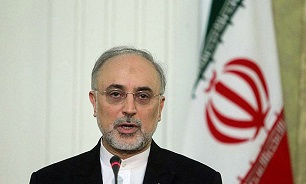Iran Topping Region in Radio-Drugs
 Salehi made the remarks on Sunday while detailing on the scientific progress made by the country in the field of nuclear science since the 1979 revolution.
Salehi made the remarks on Sunday while detailing on the scientific progress made by the country in the field of nuclear science since the 1979 revolution.
“We are in a position where we can design centrifuges instead of reverse engineering them,” he said, adding that Iran stands out among developing countries who have the capability to produce heavy water with the best quality.
The nuclear chief went on to touch upon the capability to produce centrifuges, saying, “We used to import centrifuges from outside the country and it would take us 7 to 8 years to operate them. We with reverse engineering were able to produce replicas of the first-generation centrifuges.”
He added, “We can produce 2, 3, 4- generation and even IR-8 centrifuges now. Therefore, we can say we are in a position where the Islamic Republic of Iran can design a centrifuge instead of reverse engineering it.”
Salehi went on to talk about the utilization of nuclear industry in different fields like oil and agriculture sectors.
The nuclear chief further noted that Iran is now spearheading other countries in the West Asian region in terms of producing radiopharmaceuticals, saying that Iran is now exporting its products to more than 10 countries.
In a related front, earlier on January 30, Salehi said that the country has a good status of uranium reserves, adding that Tehran will increase the number of yellowcake plants with 100% reliance on its own human resources.
Salehi said that Iran will build several yellowcake plants in Yazd province, central Iran.
He made the remarks in a live TV program aired at Islamic Republic of Iran Broadcasting (IRIB).
Pointing to the shipment of second yellowcake consignment from a factory in Ardakan, Yazd, to Isfahan, he noted, “We will have similar factories in several regions of Yazd province in the future.”
He went on to say that the yellowcake facility in Ardakan had been developed by Iranian experts using state-of-the-art technologies, adding that it is the second of its kind after the first in Bandar Abbas.
Asked about the status of uranium explorations in the country, Salehi said that from about 2010, with the support and advice of Leader of the Islamic Revolution Ayatollah Seyed Ali Khamenei, Iran started the aerial uranium exploration and up to now some 80 percent of the country's lands has been examined. All the analysis and interpretations of these data are being carried out by Iranian experts, he highlighted.
It was assumed in the past that Iran is short of uranium but explorations proved that it is not either poor or rich in this regard, Salehi maintained, adding that as far as strategic reserves are concerned, Iran has good condition.
Elsewhere, he noted that the greatest achievement of Iran in the nuclear industry is that today “we can be designers,” adding, “We do not need reverse engineering (in this industry).”
He also pointed to nuclear cooperation between Iran and European countries, saying, “They have invested $20 million in our nuclear facilities, and have provided a lot of training courses, and have a very good nuclear cooperation (with Iran), and there is no particular problem.”
In a related front, earlier on January 13, Salehi announced that the country is taking the preliminary steps to produce what he called "modern 20%-enriched uranium" to fuel the country's reactors.
"The preliminary moves have started to design modern 20%-enriched fuel and we are on the threshold of it," Salehi said.
"It is a product different from the former 20%-enriched fuel which could be used to fuel whatever reactor we build like the Tehran reactor," he added.
"The nuclear reactor in Tehran has been working with the old fuel so far, but the modern fuel will increase its efficiency," Salehi said.
The AEOI head had earlier warned that his country enjoyed the capability to restore 20-percent uranium enrichment if the 2015 nuclear deal was discarded by parties still remaining under the agreement.
Salehi said in December that under the 2015 nuclear deal, Iran accepted to put confidence-building curbs on its nuclear program, but they do not obstruct the “peaceful activities of Iran’s nuclear industry”.
“Enrichment is currently underway, but we would put aside the 300kg limit (set by the nuclear agreement) whenever we wish, and would do the enrichment at any volume and level,” he said in an interview with state TV on the sidelines of a visit to the Fordo nuclear facility.
“We currently have 1,044 centrifuges in Fordo, and if the establishment wants, we will restart 20-percent uranium enrichment in Fordo,” he noted.
Salehi expressed hope that the remaining parties to the nuclear agreement would deliver on their promise and implement their commitments in order to fill the gap created by the US after its unilateral withdrawal from deal, officially known as the Joint Comprehensive Plan of Action (JCPOA).
Otherwise, he said, Iran will have to reduce its JCPOA commitments.
“I would like to warn that this is not a bluff; I have kept my word whenever I’ve said something. Now I’m emphasizing once again that if the establishment wants, we can easily return to the 20-percent enrichment, and meet the country’s needs at any level and volume,” he noted.
Message end/
